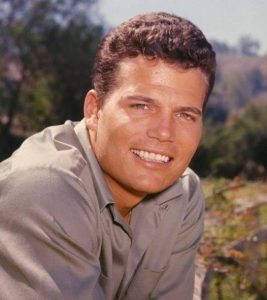Patrick Wayne, born into one of Hollywood’s most iconic families, has lived a life shaped by both privilege and pressure. As the son of John Wayne—the towering legend of Western cinema—Patrick was destined to face a world filled with expectations. Yet instead of merely walking in his father’s footsteps, Patrick has spent his life forging his own path, gradually building a career defined by dedication, skill, and quiet strength. Now at the age of 84, his journey is one that reflects not only his love for acting but also a determination to emerge from the immense shadow of his father and become a respected name in his own right.

From a very young age, Patrick was no stranger to the world of lights, cameras, and action. Born in 1939, he grew up surrounded by the enchantment of Hollywood’s golden era. His first appearance on screen came in Rio Grande—a 1950 Western directed by John Ford—where he played a small role alongside his father. While some might see that debut as a classic example of nepotism, for Patrick, it was a learning opportunity. Instead of riding on his father’s fame, he took the moment seriously, absorbing the intricacies of the film industry from behind the scenes and observing seasoned actors at work. It was in these early moments that Patrick realized acting wasn’t just a family tradition—it was his passion.
A major influence during Patrick’s early years was director John Ford, a close family friend and one of the most respected filmmakers of his time. Ford played a key role in shaping Patrick’s approach to acting. Known for his meticulous directing style and keen eye for talent, Ford helped Patrick refine his performance and understand the subtle nuances that separate a good actor from a great one. Under Ford’s mentorship, Patrick began to blossom, proving that he had the drive and talent to make it on his own terms.
As Patrick matured into his twenties and thirties, he began taking on more substantial roles that helped separate his image from that of his father’s. The turning point came when he entered the world of science fiction, starring in cult classics like Sinbad and the Eye of the Tiger and The People That Time Forgot. These adventurous tales showcased him as a leading man capable of carrying a film—battling monsters, discovering lost civilizations, and doing it all with a charisma that captivated audiences. While John Wayne was known for playing tough cowboys and war heroes, Patrick found success in a different kind of fantasy-driven heroism, which helped define his own niche in Hollywood.
Despite his success in film, Patrick’s true versatility emerged in his television work. Over the years, he appeared in numerous series across a variety of genres, from classic westerns to family dramas. In each role, he displayed a range that surprised many critics and delighted fans. His performances were not just reliant on his name; instead, they reflected years of hard work, adaptability, and genuine talent. He could seamlessly transition from action-packed scenes to emotionally complex moments, proving himself as more than just the son of a star. Patrick earned the respect of his peers and built a reputation as an actor who brought depth and authenticity to every performance.
Yet, Patrick Wayne’s life has not been without its challenges. Living under the constant gaze of the public and bearing the Wayne name came with its own set of pressures. Comparisons to his father were inevitable, and for many years, he had to work twice as hard to be seen as more than just “John Wayne’s boy.” But Patrick never let those comparisons derail him. Instead, he used them as motivation—to honor his father’s legacy while building something of his own. He once noted that being John Wayne’s son taught him two crucial lessons: the value of hard work and the importance of integrity. These principles became the foundation of his career and guided him through the unpredictable ups and downs of the entertainment industry.
In interviews, Patrick has often spoken with reverence about his father, describing him as a man of deep convictions, generosity, and larger-than-life presence. But he has also been clear about his desire to build his own legacy. For Patrick, success wasn’t about outshining his father—it was about living up to the values that made John Wayne great while simultaneously becoming his own man. That mindset gave him the resilience to keep moving forward, even during periods when roles were scarce or public interest waned.
Looking back over more than eight decades of life and a career that has spanned film, television, and even game show hosting, Patrick Wayne stands as a symbol of quiet endurance. He didn’t chase fame for the sake of fame. He didn’t ride on coattails. Instead, he showed up—day after day, role after role—and earned his place in the hearts of viewers. Whether playing a heroic adventurer, a romantic lead, or a small-town everyman, Patrick brought sincerity and depth to every character.
Today, Patrick Wayne remains a testament to what it means to live a life rooted in authenticity. In an industry often defined by fleeting stardom and reinvention, he has remained steady and true to himself. His story is a powerful reminder that while lineage may open doors, it is character, determination, and personal growth that ultimately shape a legacy. Patrick Wayne didn’t just carry on the Wayne name—he gave it a new chapter, one filled with integrity, heart, and his own brand of Hollywood greatness.





